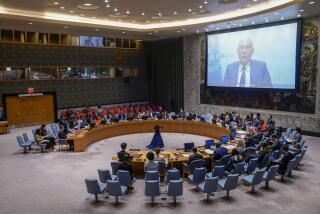Burma bending slightly, U.N. is told
- Share via
UNITED NATIONS — The U.N. envoy to Myanmar told the Security Council on Tuesday that the country’s military regime had bowed slightly to international pressure to talk to its opposition but still holds tightly to power.
The Security Council, in turn, is divided on whether sanctions or more dialogue would best move the Southeast Asian nation to improve human rights and poor living conditions that are the source of domestic dissent and unrest. China and other nations insist that Myanmar’s conflict is an internal matter and not the council’s business.
The United States, Britain and France said engagement should be balanced with penalties if Myanmar continued to defy the council’s demand to release and meet with opponents.
“A process for process’ sake will not be acceptable,” said U.S. Ambassador Zalmay Khalilzad.
U.N. envoy Ibrahim Gambari said leaders in Southeast Asia had told him that sanctions against Myanmar would be counterproductive, but that its neighbors would provide humanitarian and economic support while the country grapples with a plan for more democracy.
Dialogue with the opposition “is the only way forward for Myanmar,” Gambari said, and “will require time, patience and persistence.”
In his report, Gambari emphasized the positive side of his second visit to Myanmar, also known as Burma, since the regime’s crackdown on peaceful demonstrations in September and October.
As a result of his talks with senior figures, the government allowed the country’s most prominent pro-democracy leader, Nobel Peace Prize laureate Aung San Suu Kyi, who is under house arrest, to make a public statement and meet with top officials of her party for the first time since 2004. Suu Kyi and three colleagues from her National League for Democracy held preliminary discussions Friday with a government official to prepare for direct negotiations.
Gambari also said the government had consented to a visit by U.N. human rights envoy Paulo Sergio Pinheiro for the first time in more than four years, and had promised to end political arrests and release monks and other demonstrators detained in recent protests. Pinheiro arrived Monday in Yangon, the country’s main city.
However, those positive steps were countered by defiant signals that challenges would not be tolerated. On the eve of Gambari’s recent visit, the regime expelled the top United Nations official in the country, Charles Petrie, for his public criticisms of the government. Myanmar’s top official, Senior Gen. Than Shwe, refused to meet Gambari and rejected requests to release Suu Kyi, who has been under detention for 12 of the last 18 years.
Despite pledges to end arrests, the government Tuesday detained a labor activist, Su Su Nway, and student Bo Bo Win Hlaing. During Gambari’s visit, authorities also arrested U Gambira, a leader of an alliance of monks.
Gambari acknowledged that his mission did not “produce all the results that I had hoped for.” But he noted that the conflicts had eased and that the government had made concessions.
Myanmar’s ambassador to the U.N., Kyaw Tint Swe, made it clear that his government expected rewards for its positive moves and that sanctions or criticism would be met with further defiance.
“This is a time for encouragement and not undue outside pressure,” he told the Security Council. “The council should provide encouragement and refrain from taking any action at this critical juncture.”
More to Read
Sign up for Essential California
The most important California stories and recommendations in your inbox every morning.
You may occasionally receive promotional content from the Los Angeles Times.












